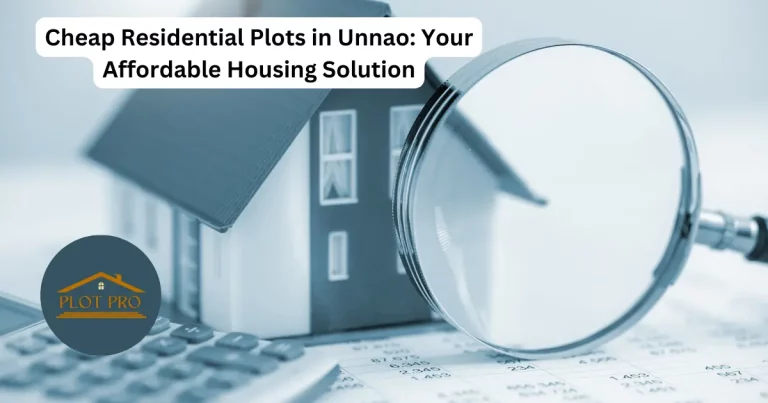11 Facts to Consider on Cheap Residential Plots: Unnao

When considering the purchase of cheap residential plots in Unnao, it’s crucial to establish a clear investment strategy. This will help guide your decisions and maximize your potential returns.
1.Locality Analysis for Plot Investments in Unnao
Thoroughly researching the locality is crucial when considering plot investments. Here are some key points to focus on:
- Proximity to Essential Facilities: Evaluate the distance to vital infrastructure such as transportation links, water supply, and electricity availability. These are fundamental for any development and increase the land’s value.
- Nearby Commercial Hubs: The closeness to commercial centers can significantly enhance the attractiveness and value of a plot. Areas near marketplaces, business parks, and shops are preferable for both residential and commercial developments.
- Access to Residential Areas: Plots near established residential zones tend to have higher demand due to the existing community infrastructure like schools, hospitals, and recreational areas.
- Developmental Plans: Investigate any future developmental plans in the area, such as new roads, public transport expansions, or other municipal projects that can boost property values.
- Environmental Quality: Assess the environmental attributes of the area, including air quality, noise levels, and green spaces. A healthier, more appealing environment can significantly impact the desirability of the plot.
- Safety and Security: The safety of the area is paramount. Check local crime statistics and the presence of law enforcement in the area. Safe neighborhoods are always more attractive for buyers and renters.
- Local Economy: The strength of the local economy can influence property values. A robust local economy with employment opportunities can attract more residents and increase demand for housing.
- Popular Localities: In Unnao, areas like Magarwara, Bangarmau, and Piper Khera are noted for their popularity. These localities are often preferred due to their strategic locations and potential for growth.
2.Step-by-Step Process for Purchasing a Plot
Buying a plot involves several critical steps that require careful attention to detail. Here’s a concise guide to help you navigate the process:
- Research: Start with thorough research about the potential plots, focusing on location, price trends, and future development plans in the area.
- Property Search: Identify suitable plots based on your criteria such as size, location, and budget. Utilize various resources like real estate agents, online property portals, and local listings.
- Document Checks: Verify all essential documents to ensure the legality of the plot. This includes checking the title deed, encumbrance certificate, property tax receipts, and local body approvals.
- Sale Agreement: Once you decide on a plot, draft a sale agreement that outlines the terms and conditions of the sale, including payment terms, transfer of ownership, and any other agreements between the buyer and seller.
- Sales Deed: The final step is the execution of the sales deed, which legally transfers ownership from the seller to the buyer. Ensure that this document is registered and that all necessary stamp duties are paid.
3.Residential Plots in Unnao: Investment Strategy
- Define Your Investment Goals: Clearly outline what you aim to achieve with your land investment. Are you looking to build a home, sell the land later at a profit, or hold onto it for long-term appreciation? Your goals will influence the type of plot you should consider.
- Research the Market: Understand the current market trends in Unnao. Look into the average prices of residential plots and the factors influencing these costs. This will help you identify the right time and the right price to make a purchase.
- Location Analysis: The location of the plot significantly affects its future value. Look for plots in areas that are expected to develop in the coming years. Proximity to major roads, schools, hospitals, and commercial centers can enhance the value of the plot.
- Legal Due Diligence: Before making any purchase, ensure the plot has clear legal titles and there are no disputes associated with it. Verify all documentation and consider consulting a legal expert to avoid future complications.
- Infrastructure Development: Check the infrastructure developments around the area. Basic amenities like water, electricity, and road connectivity are crucial and will affect the plot’s appreciation rate.
- Future Development Plans: Investigate any future development plans in the area, such as new public projects, industrial developments, or government initiatives that might increase the land’s value.
- Assess Risks: Every investment comes with its risks. Consider factors like environmental risks, the potential for zoning changes, and market volatility. Assessing these risks will help you make a more informed decision.
- Exit Strategy: Have a clear exit strategy in place. Whether you plan to sell after a certain period, develop the land, or pass it on as an inheritance, knowing your exit strategy in advance will help in planning your investment journey.
4.Land Evaluation: Understanding Different Evaluation Methods
Evaluating land effectively requires understanding various methods that can help determine its best use and value. Here are some key evaluation methods used in land assessment:
- Comparative Analysis: This method involves comparing the subject land with similar properties that have recently been sold. Adjustments are made for differences in size, location, and features to estimate the land’s value.
- Extraction Method: This approach extracts the land value from properties where the land and buildings have been sold together. It’s particularly useful when comparable vacant land sales data is scarce.
- Development Method: Used primarily for land that will be developed, this method calculates value based on the potential income or sale price of the developed property minus the cost of development, including profit margin.
- Allocation Method: This method allocates a proportion of the total value of a developed property to the land, based on factors like market conditions and development costs.
- Belting Method: This approach values land based on its location in relation to a central point, typically valuing land closer to the center more highly. It’s useful in urban planning and real estate development.
5.Risk Assessment in Plot Investments
Being aware of potential risks is crucial when investing in plots. Here are some key risks to consider:
- Title Clearance: Ensure the land has a clear title without any disputes or legal issues. This is fundamental to avoid future legal complications.
- Change of Land Use Clearance: If planning to change the land’s use from agricultural to non-agricultural or vice versa, ensure that all necessary permissions are obtained to avoid legal and regulatory issues.
- Zoning Risks: Understand the zoning regulations of the area. Zoning laws can affect what types of buildings and activities are permitted on the plot.
- Liquidity Risk: Consider the ease of selling the property. Some plots, especially in less developed or less accessible areas, might take longer to sell and may not fetch the expected market value quickly.
- Longer Investment Horizons: Land investments can sometimes require a long-term perspective to realize significant gains, especially in undeveloped areas.
- Encroachments: Be vigilant about any illegal encroachments or unauthorized uses of the land, as these can complicate ownership and use of the property.
6.Important Documents to Verify Before Buying a Plot
Ensuring you have all the necessary documents in order before purchasing a plot is crucial to validate the legality of the transaction and to protect your investment. Here are essential documents to verify:
- Title Deed: Confirms the seller’s ownership of the property and your legal right to purchase it.
- Encumbrance Certificate: Indicates that the property is free from any legal liabilities or loans, ensuring a clear title.
- Property Tax Receipts: Shows that all taxes have been paid up to date, which is crucial for transferring ownership.
- NA Orders (Non-Agricultural Land): If the land was previously used for agriculture, this certificate is necessary to confirm its conversion for residential or commercial use.
- Local Body Approvals: Includes permissions from municipal corporations or local bodies for utilities, construction, and adherence to local laws.
- Release Certificate: If the land was previously under a mortgage, this certificate releases it from any encumbrance or lien.
- Stamp Duty and Registration: Legal documents proving that stamp duty has been paid and the property has been registered in your name.
7.Tips for Securing Loans for Plot Purchase
Financing a plot purchase can be different from other types of property investments. Here are some tips to consider if you need financing:
- Get a Construction Loan: If you plan to build on the plot, consider applying for a construction loan. These loans are designed specifically for financing the costs associated with building a new structure, and they can often be converted into a mortgage once construction is complete.
- Make a Large Down Payment: Providing a larger down payment can improve your loan terms, including lower interest rates and better loan conditions. This also reduces the loan amount and potentially the duration of the loan.
- Maintain a Good Credit Score: A higher credit score can significantly improve your chances of securing a loan with favorable terms. Good credit scores are often associated with better interest rates and loan offers.
- Manage Income and Debt Ratio: Lenders will look at your debt-to-income ratio to determine your ability to repay the loan. Keeping this ratio low by managing your debts efficiently and maintaining a stable income can help in securing a loan for your plot purchase.
8.Capital Gain Computation for Land Properties
Understanding how capital gains are calculated and the potential tax exemptions available can significantly impact your financial planning when dealing with land properties. Here are key points to consider:
- Capital Gain Calculation: Capital gains are generally calculated by subtracting the purchase price of the land (plus any improvements) from the selling price. Adjustments may be made for transaction costs such as commissions and legal fees.
- Short-Term vs. Long-Term Gains: Gains on assets held for less than a year are typically considered short-term and are taxed at higher ordinary income rates. Gains on assets held for more than a year are considered long-term and are taxed at lower rates.
- Exemptions on Capital Gains: There are several exemptions available that can reduce or eliminate capital gains tax. For instance, the sale of a primary residence may allow you to exclude up to $250,000 (or $500,000 for married couples filing jointly) of capital gains if certain conditions are met, such as having lived in the residence for at least two of the five years preceding the sale.
- Special Rules for Real Estate: Specific rules apply to real estate capital gains, such as the possibility to defer capital gains taxes through mechanisms like 1031 exchanges, where the proceeds from the sale are reinvested in similar property.
- Indexation Benefit: For long-term capital gains, the benefit of indexation can be used to adjust the purchase price of an asset to reflect inflation, effectively reducing the taxable amount of the gain.
- Capital Gains Account Scheme: If you’re planning to reinvest your capital gains into new property but haven’t done so by the time of tax filing, you can deposit the gains into a Capital Gains Account Scheme to avoid taxes until the new property is purchased.
9.Benefits of Plot Investments: Maximizing Returns with Strategic Choices
- High Return Potential: Plots often offer higher average returns compared to other types of real estate investments. Returns can range from 15% to 20% and can be even higher with the right factors in place.
- Value Appreciation: The value of land tends to increase over time, making it a good investment for capital appreciation. Factors such as infrastructure development and the establishment of commercial corridors significantly enhance this appreciation.
- Flexibility in Use: Owning a plot gives you the flexibility to use the land for various purposes, including building a house, creating a commercial establishment, or holding it as an investment for future sale.
- Control Over Property: Unlike other real estate investments, owning a plot gives you full control over the property. You can decide when to develop, sell, or hold the land based on market conditions and personal circumstances.
- Lower Maintenance: Compared to properties with structures, plots require minimal maintenance, which can reduce ongoing costs significantly.
- Scarcity: Land is a finite resource, which means its value can increase simply due to increasing demand against limited supply, especially in urban and developing areas.
- Development Potential: A plot in a good location offers potential for various types of development. As the area around the plot develops, the increase in accessibility and amenities can exponentially increase the plot’s value.
- Strategic Long-Term Investment: For those looking at the long-term horizon, plots can serve as an excellent hedge against inflation and market volatility, especially in growing economies.
10.Selecting the Type of Land for Investment
- Categorize the Land: Determine whether the land is agricultural or non-agricultural. This classification will affect permissible uses and development potential.
- Non-Agricultural Land: Typically more suitable for residential purposes due to fewer restrictions compared to agricultural land. This type of land is often already zoned for residential use, making the development process smoother.
- Agricultural Land:
- Often requires re-zoning to be developed for non-agricultural purposes, which can be a complex and time-consuming process.
- May come with tax benefits or subsidies aimed at promoting agricultural activities.
- Understanding the specific agricultural classification can provide insights into the land’s quality and suitability for various crops if maintaining its agricultural use.
- Regulatory Considerations: Each type of land comes with its own regulatory framework. Non-agricultural land might have different building codes, density requirements, and environmental regulations compared to agricultural land.
- Potential Uses:
- Residential Development: Non-agricultural land is generally more adaptable for residential structures, subdivisions, and other housing projects.
- Agricultural Production: Agricultural land is best used for farming, livestock rearing, and other related activities. It can also support agri-tourism and similar ventures.
- Conversion Potential: Converting agricultural land to non-agricultural uses involves legal procedures, potential resistance from local communities, and significant costs. Assess the feasibility and economic viability of such conversions.
- Environmental Impact: Consider the environmental implications of changing land use, especially from agricultural to non-agricultural, which can affect local ecosystems, water resources, and biodiversity.
- Market Trends: Analyze market trends for both types of land. Non-agricultural land might have a higher immediate value increase potential, especially in rapidly urbanizing areas, whereas agricultural land could be a long-term investment depending on agricultural viability and policy changes.
11.Relevant External Links for Real Estate and Plot Investment
- Investopedia Real Estate Guide: A comprehensive resource for learning about different aspects of real estate investments.
- BiggerPockets: A platform offering articles, forums, and podcasts on real estate investment strategies.
- LegalZoom Real Estate: Provides legal advice and services for real estate transactions, including plot purchases.
- Bankrate Mortgage Calculator: Tools to calculate mortgage payments and other financial aspects of buying land.
- NerdWallet Mortgage Rates: A resource for comparing current mortgage rates and financial planning for land purchases.
- Reddit Real Estate Forum: A community forum where individuals share experiences and advice on real estate investments.
- Community Forum Code of Conduct: Guidelines for engaging in community discussions effectively and respectfully.
Disclaimer
Please note: The information provided is for general awareness purposes only and does not constitute investment advice. Potential buyers should conduct their own research or consult with a professional advisor before making any investment decisions.
Ashwin
Recent Posts
Land Investment Hub: Empowering you with dynamic insights into residential plots, apartments, and government schemes. Navigate the ever-changing landscape of real estate with our informative resources.
Support
Let's Talk!
Feel free to reach out to us for any inquiries, assistance, or to discuss investment opportunities.
Copyright © 2024 Plot Pro


